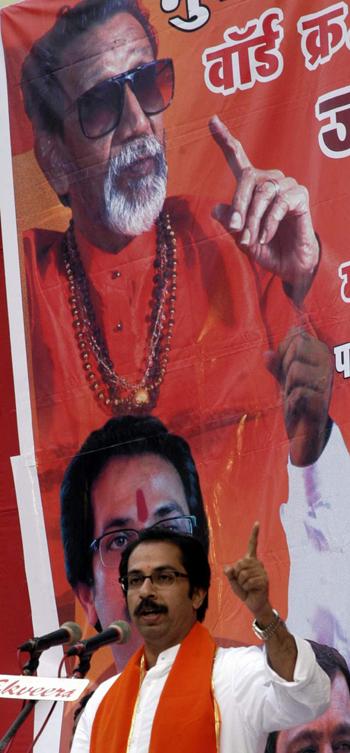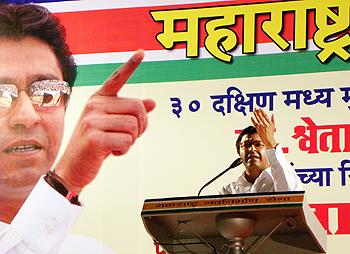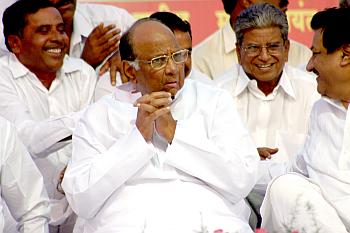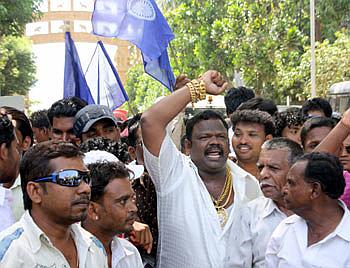Photographs: Sahil Salvi
Will his cousin Raj Thackeray, president of the Maharashtra Navnirman Sena, emerge as a force to reckon with as his party makes its first bid in the state election or will he just play spoilsport?
Is the sun setting on Nationalist Congress Party Chief Sharad Pawar's political career?
How will the Shiv Sena-Bharatiya Janata Party and Congress-NCP alliances fare this election?
Why is terrorism not an issue in the state despite the November 26 attacks?
And, howsoever stale this question may sound, what ails Dalit unity in Maharashtra?
These are some of the questions rediff.com's Prasanna D Zore posed to Kumar Ketkar, editor of the Marathi newspaper Loksatta, a part of the Indian Express Group -- and one of the most best-informed commentators on Maharashtra politics.
The answers, of course, are interesting as well as enlightening.
Will the Shiv Sena-BJP alliance break the election jinx the third time?
If the Shiv Sena were to campaign well, then perhaps they could do it. Today the mood all over the state is of anti-incumbent anger. People are not happy with the Congress-NCP governance for the last ten years. Unfortunately, the Sena-BJP combine has failed to provide a credible alternative programme to the people.
The BJP is in shambles in Maharashtra and they do not have any vision. So they are riding only on the discontent against the incumbent. As a result those who are against the Congress-NCP front and also not favouring the Sena-BJP combine may go to the MNS and some of them may go to the Third Front.
But a majority of them will say that a known devil is better than an unknown devil and may go with the Congress-NCP.
The Congress has an edge, but not a sharp one this time. The Sena-BJP can blunt it with proper organisation and a programme.
Is Uddhav Thackeray chief minister material? There are voices from the Sena about elevating Uddhav to the post of chief minister if the Sena-BJP alliance comes to power.
In what way can you say that Vilasrao (Deshmukh, the previous chief minister of Maharashtra) is CM material? I mean Vilasrao has done nothing during his chief ministership.
The point is will Sena supremo Bal Thackeray let Uddhav become CM?
Yes, very much so.
In fact, Bal Thackeray wants his son to become the CM. Tell me who in the Congress and the NCP is CM material?
In the Congress, the CM material position comes not from an individual's exceptional leadership qualities, but from the history of the Congress legacy.
The Shiv Sena is a personality driven party. Everybody accuses the Congress of being personality-driven, family-driven party. But that's not true.
While the Congress still ruled the country (1991 to 1996)when Sonia Gandhi was not at the helm of affairs, the Shiv Sena is definitely completely dependent on the family. So the family's credibility matters and Bal Thackeray has a lot of support and appeal amongst the masses of the state.
Uddhav Thackeray will gain from that and once he becomes the CM he will handle issues in his own style.
Why is the Sena-BJP alliance so edgy about making an issue out of 26/11 and the government's failure in preventing it?
I don't think they are edgy in raising security issues, but security issues don't occupy people's mindspace anymore.
26/11 is not an issue even in Mumbai.
While terrorism and national security is an issue, but it is not so important as to swing an election this way or that way.
The more important issues are farmers's suicides, price rise, urban mismanagement, slum improvement schemes, corruption and non-governance. These are more important issues than terrorism.
'Raj Thackeray will never have any alliance with Uddhav'
Image: Raj Thackeray addresses a rally during the 2009 Lok Sabha electionPhotographs: Satish Bodas
Just 20 years ago the Congress was getting some 200 plus seats on its own steam. Now it is reduced to just 75 seats (adding those who defected from the Shiv Sena and joined the Congress along with Narayan Rane). And if some reports are to be believed they will be happy if they get 90 seats this time.
So why are they now happy with just 90 seats when they were getting 200 seats? The reason is over the years their base was weakened by the Sena. The Sena ate into the Congress's support.
Now the MNS has started eating into the Shiv Sena's base. They talk about the Marathi vote split, but let us not forget what Raj Thackeray says which I think is right (that the Sena could not win a single Lok Sabha seat in Mumbai in the 2004 general election when the MNS was not even in existence).
In the 2004 Lok Sabha election the Congress won five seats despite the MNS. They won the same number of seats in 2009 after the MNS came into the electoral arena.
So to conclude that all six Lok Sabha seats went to the Congress-NCP because of the MNS is not correct.
But if one adds up the numbers the MNS secured during the 2009 Lok Sabha polls...
Obviously, it is because of the MNS that the Congress won three seats in the city. The point is to say that the MNS is stealing from the Shiv Sena vote is not correct. The MNS is stealing from the overall anti-Congress vote. They are not eating into the Sena vote only because there is a strong presence of the anti-Congress vote.
In Maharashtra there was a huge 62 per cent anti-Congress vote even in the Lok Sabha. Anybody who mobilises these votes on a common platform will win hands down. At the same time while the Third Front will not give a major blow to the Congress-NCP they can easily make an impact in about 20 seats.
Critics argue that Raj Thackeray is an urban phenomenon. But almost 130 out of the state's 288 assembly seats are now urban seats. What impact will the MNS have on and after the assembly election?
The MNS certainly will make a good impact in these elections though it is difficult to quantify how good that will be. According to me even if he gets 10 seats it will be good. Because it's good if a three-year-old party gets 10 assembly seats on debut. He is not campaigning for 2009; he has his eyes set on the 2014 assembly election.
This is his very early dress rehearsal. Also, he is not looking at 2014 with an absolute majority in mind.
So after these elections even if he makes both the alliances (the Congress-NCP, Sena-BJP) dependent on him, he will have achieved it. Even if he fails to do it there's nothing to lose because in 2014 Sharad Pawar will be far off in terms of age and politics and nobody in the Congress can claim as much charisma as Raj does.
So the contest at that time will be primarily between Raj and Uddhav and perhaps Supriya Sule (Sharad Pawar's daughter and the MP from Baramati) instead of Sharad Pawar.
Sena leader Manohar Joshi's recent statements that Raj and Uddhav are at the same level when it comes to welfare of the Marathi manoos seems to indicate that the two cousins might be planning for a rapprochement. Do you see such a possibility?
Absolutely not! Nothing is happening between Raj and Uddhav. Raj Thackeray will never have any kind of alliance with Uddhav. Because (their relationship) has gone beyond a certain point now.
Do you see the anti-immigration issue hotting up as we near the election?
This can happen only in the Mumbai-Thane-Nashik belt and partly in the Konkan. But this belt (Mumbai-Thane) has more than 76 seats and the results here can swing the results this way or that way. It hardly matters in Vidarbha or Marathwada.
Do you see a vertical split in the Sena if it fails to make it this time around?
Not a vertical split, but the Shiv Sena will become very weak. Uddhav's leadership will be under intense scrutiny as he will become very weak in the event of the Sena not getting more than 80 seats.
If he gets that number he will be able to carry on even if his party doesn't come to power. However, if he comes to power then Raj will become very weak.
'Pawar's sun rose but somehow it could never reach the noon point'
Image: Sharad Pawar in a pensive mood during an election rally in Satara in AprilPhotographs: Sanjay Sawant
Actually the changes began to take place a decade ago when Sharad Pawar split the Congress party on the question of Sonia Gandhi's foreign origin.
After Sharad Pawar left the Congress in 1999, things began to change when the NCP fought the election separately against the Congress and yet after the election they formed an alliance with them. So one can say that the political landscape began to change after 1999.
However the NCP, which was emerging as an alternative to the Congress in 1999, could not get many seats even in 1999. Again in the 2004 general election, Sharad Pawar's NCP could not get many seats though he fought in alliance with the Congress. But getting only 8 seats against the Congress's 17 in the 2009 Lok Sabha election marginalised him.
As a result it can be seen that the NCP's tally never crosses the 71-seat limit. Even when Sharad Pawar split from the Congress and formed the Congress-S they got only 57 seats in 1980.
So the point is Sharad Pawar's capacity to win seats has peaked at 71 in the 2004 assembly election. This is a major change that has taken place.
The Sena-BJP could have won in 1999 because they didn't do too badly then. The point is in the last ten years or ever since the Sena-BJP combine came to power in 1995 they have not been able to give a vision statement to the people of Maharashtra.
On the other hand, the Congress and NCP have a running programme, a national leadership, a national policy, implemented partly in the state and partly at the Centre, which is missing in the Sena-BJP alliance. So the Sena-BJP is an amorphous alliance without any vision or programme. Yet it must be said that they have a very good mass support and a cadre-based network.
Actually I would say that among the Marathi people in the Mumbai-Pune-Thane-Nashik belt, the Sena before the birth of the MNS had a sizeable support of the Marathi people and it should not be ignored.
In Western Maharashtra, Vidarbha or Konkan or in Marathwada, the MNS and Sena didn't do as well -- actually, the Sena does reasonably well in Marathwada. But now they have established a very strong foothold in Marathwada and Vidarbha.
This clearly indicates that the Sena has a good mass base. As a result, the Sena got 12 Lok Sabha seats from Maharashtra during the 2009 election.
Whereas the Sena has mass support and mass appeal, the Congress has a network of organisations -- sugar cooperatives, banks, educational institutes -- and through this network they run their party.
The Sena has followers and cadres; the BJP doesn't have followers, but has cadres; the Congress has neither cadres nor followers but has strong entrenched vested interest support.
The Congress is not a party of the masses in Maharashtra; it is a party of a networked people with strong vested interests that was built and nurtured over the last 60 years. And even if the banks and sugar cooperatives have made losses the network has survived. The institutions may be on the verge of collapse, but the network is strong and the people connected with this network are a part of the Congress establishment.
As a result of this when it comes to the election the BJP-Sena cannot win because it requires a certain kind of organisation, vested interest groups, obligatory networks that come into play.
Do you think the sun is setting on Sharad Pawar's political career?
So many times the sun had set on Sharad Pawar and he has survived. So I don't think it is proper to say that sun is setting on his political career. The point is Sharad Pawar's sun rose, but it could never reach the noon point. It rose and somehow remained where it is.
The reason being he had his support base mainly in western Maharashtra; he has not been able to win Konkan, Vidarbha, Marathwada or certain urban pockets in the state. He has no base in Mumbai as such. So he has support only in those areas where strong vested interests dominate.
Even that support base seem to have developed cracks during the 2009 Lok Sabha polls.
That has happened because of the style in which he works. Unlike the Congress, which has a diffused, decentralised power structure, Sharad Pawar has a very centralised command over the NCP.
Interestingly, all the people who get elected from the NCP have their independent mass base. Remove Sharad Pawar and still they will get elected.
Jayant Patil (Maharashtra's home minister) is not dependent on Sharad Pawar; Praful Patel (the Union civil aviation minister) is not dependent on him while they all belong to the NCP.
The NCP is a federation of satraps. Whereas the Congress is a party that has been built over the years with institutional support and some mass base.
'Dalit leadership is concentrated in the hands of neo-Buddhists'
Image: Dalits at a protest rally in MumbaiPhotographs: Rediff Archives
This has not happened because of the total bankruptcy of the recent Dalit leadership in failing to mobilise all other backward castes, scheduled castes and scheduled tribes under a common fold.
Dr B R Ambedkar gave them such a fantastic platform that they could have been the leaders in the state. Ambedkar gave them a platform, a vision, a programme. But the entire Dalit leadership is concentrated in the hands of neo-Buddhists or Mahars.
It doesn't take into account that it is supposed to lead the entire block of SCs, STs, BCs and OBCs into power. These together make up for more than 55 per cent of Maharashtra's electorate. That's what Dr Ambedkar wished.
Actually the new band of Dalit leaders has wasted a huge opportunity. On the whole the Dalit leadership is responsible for the absence of proper Dalit unity in Maharashtra.
It seems like this is a very dull election with political parties having no issues with which to go to the voters. Who will benefit from the absence of important issues?
We cannot call it a dull election because it will produce a hung assembly most likely. Even if it throws a winner with a slender lead over others it will be a small majority assembly. Whoever will form a government will have to depend on various denominations for gaining stability.
Even if the Sena-BJP gets 135 they will have to depend on others; even if the Congress-NCP combine gets 150 they will have to depend on others. So there is going to be a conflict all the time with a fractured mandate that the next assembly is likely to throw.
And a fractured mandate from the media point of view is always interesting, it will be interesting even from the people's point of view because of the uncertainties and uncertainties are always exciting. Whereas a certain majority and stability is boring.
So this is not a dull election, but it is an issueless election except for one issue. And it is that this government in power has done nothing in the last ten years and therefore their complete non-performance and non-governance can make it a big issue.
But unfortunately the Opposition is not adequately prepared with an alternative programme to challenge this alliance.





article